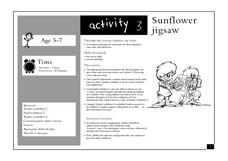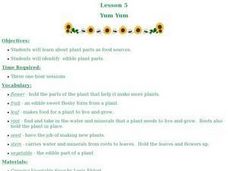Curated OER
Learning the Parts of a Plant
First graders discover the anatomy of a plant by labeling a picture. In this botany lesson, 1st graders examine and dissect several real plants in class and define their different parts. Students utilize the Internet to view...
Curated OER
The Seed Match
Students examine seeds and predict the plant it comes from. In this seed match lesson, students match seeds to plants and then see if their predictions are correct. Students predict the number of seeds found in plants as well. Students...
Curated OER
Sunflower Jigsaw
Students recognize and name the main parts of a flower. In this life science lesson, the teacher leads a discussion about the parts of a plant, then students color and cut out the parts of a planet, then glue the parts together...
Curated OER
Gifts from the Sea
Students investigate parts of the ocean. In this seaweed lesson, students identify foods that contain seaweed, parts of seaweed, and how the ocean affects our lives. As a class students brainstorm ways we rely on the ocean and compare...
Curated OER
Plant Pipes
Students work together to discover the path water follows in plants. They create multicolored flowers. They label each part of the plant and note their function.
Curated OER
Life Cycle of Brassica Plants: Planting Seeds
Students explore botany by participating in a calendar class activity. In this plant observation lesson plan, students examine a diagram of a Brassica plant and identify its anatomy before planting their own seeds and viewing the changes...
Curated OER
Vegetable Party
Students classify vegetables and eat them as a salad. In this multi-disciplinary science and health lesson, students bring various vegetables to school and classify them in several different ways. Then with parent helpers, the students...
Curated OER
Yum Yum: Making Vegetable Soup
Students investigate agriculture by reading a book. In this plant life lesson, students read the book Growing Vegetable Soup by Louis Ehlert, and examine the ingredients used in the book's soup. Students create an experimental,...
Curated OER
Sunflower Sundance
First graders study sunflower plants and identify its parts. They plant sunflower seeds and watch them grow and make sunflowers out of paper plates and colored paper. They watch videos and visit websites about sunflowers.
Curated OER
The Plant Food Factory
Plants need sun and water to survive. Let kids discover these facts by reading a block of informational text and considering a scientific quandary. They read the text, then use the information to complete a two-part question about plant...
Curated OER
Seeds! What is Inside; How does it Grow and Why is it Important?
Students discover the importance of seeds in relationship to nature. In this plant growth lesson plan, students create a collection of seeds and discover the best type of environment to plant them. Students plant their own wheat seeds...
Curated OER
Plant Reproduction
Students investigate seeds and plant life by creating a germination chamber. In this botany lesson, students investigate the relationship between flowers and the fruit they produce while examining the structure of the flower. Students...
Curated OER
Life cycles
Students identify and explain the parts of a flower and their role in the life cycle of flowering plants, including pollination, seed dispersal, and germination. Students recap the following information: that plants need light, warmth,...
New South Wales Department of Education
Plant Features
Pine needles are actually modified leaves. In the 16th installment of 20, young scientists explore plants. Through an analysis of leaves — shape, veins, and edges — pupils see how to classify plants based on structural features.
New South Wales Department of Education
Plant Groups
Bryophytes can grow in temperatures just above zero degrees. This 17th installment in a series of 20 introduces learners to the five groups of plants: algae, bryophytes, pteridophytes, gymnosperms, and angiosperms. Classes then explore...
Curated OER
Glossaries
Explore text structure with a focus on the glossary feature in informational texts. Learners read a brief introduction before examining a glossary from a text about plants. They reference it while completing four comprehension questions....
Curated OER
The Living Environment
In this living environment worksheet, students complete a crossword puzzle given 34 clues about the various species in the environment that produce, consume and decompose. Topics also include photosynthesis, respiration, glucose, organic...
American Museum of Natural History
What's This? Feeding
Some species have pretty creative methods for catching food. Young scientists learn about some interesting ways organisms get the nutrients they need by navigating an online interactive lesson that would be suitable for a remote learning...
New South Wales Department of Education
History of Plant Classification
Bamboo, the fastest growing plant in the world, can grow up to 35 inches in one day! Pupils learn how plants historically have been classified and determine if these traits are appropriate to use in this 17th lesson of 20. They will also...
Desert Discovery
Saguaro Parts
Young biologists identify the basic structures of a saguaro cactus. They study the functions of each of the structures, and label them on a picture of a saguaro cactus embedded in the plan. This simple, and easy-to-implement lesson would...
Desert Discoveries
Built for the Desert
The saguaro cactus has an amazing ability to survive in a harsh environment. Learners identify the many adaptations for desert life that the saguaro employs. They look at each part of the saguaro and determine what role it plays in the...
ARKive
Parts of the Plant
Every good lesson on plant life should have a good worksheet to go along with it. Here is a very nice worksheet that requires students to label the four main parts of a plant. Included is a second worksheet that shows three different...
Curated OER
Container Gardening: Direct Seeding
In this science experiment worksheet, students record a check next to the 10 plants that they plan on growing in containers. Students place their containers in full sunlight.
Curated OER
How Does Your Garden Grow?
Students explore plant life by reading books about gardening. In this botany lesson, students read the books From Seed to Plant and Oh Say Can You Seed? while identifying the necessary elements to raising a healthy plant. Students view...

























